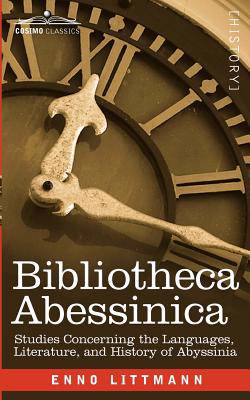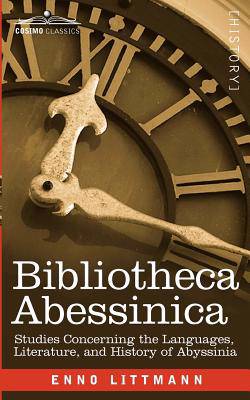
- Afhalen na 1 uur in een winkel met voorraad
- Gratis thuislevering in België vanaf € 30
- Ruim aanbod met 7 miljoen producten
- Afhalen na 1 uur in een winkel met voorraad
- Gratis thuislevering in België vanaf € 30
- Ruim aanbod met 7 miljoen producten
Zoeken
Bibliotheca Abessinica
Studies Concerning the Languages, Literature, and History of Abyssinia
Enno Littmann
Paperback | Engels
€ 29,95
+ 59 punten
Omschrijving
Bibliotheca Abessinica: Studies Concerning the Languages, Literature, and History of Abyssinia is a collection of Abyssinian works in both English and Ethiopic, or the Ge'ez language. This edition contains Volume I: The Legend of the Queen of Sheba in Axum, in English and Ge'ez with textual notes from editor Enno Littmann; Volume II: The Text of the Ethiopic Version of the Octateuch, with Special Reference to the Age and Value of the Haverford Manuscript, in English with editor's notes; and Volume III, Part II: The Octateuch in Ethiopic, Exodus and Leviticus, in Ge'ez and edited by J. Oscar Boyd. The hard-to-find third volume is complemented by its English counterpart and useful to any student of Abyssinian literature or Littmann's research. ENNO LITTMANN (1875-1958) was a German professor and orientalist who translated and authored several books (including a translation of One Thousand and One Nights). He was a master of Ethiopian and Arabic literature. Littmann is best-known for his time spent studying in Ethiopia, where he stayed with the Mensa (Tigrē) in Eritrea and wrote the well-known Princeton Expedition to Abyssinia about Ethiopian culture and music. He also studied in Aksum, where he tried his hand at archaeology and uncovered many artifacts and wrote dozens of translations during his stay.
Specificaties
Betrokkenen
- Auteur(s):
- Uitgeverij:
Inhoud
- Aantal bladzijden:
- 342
- Taal:
- Engels
Eigenschappen
- Productcode (EAN):
- 9781616404932
- Verschijningsdatum:
- 1/10/2012
- Uitvoering:
- Paperback
- Formaat:
- Trade paperback (VS)
- Afmetingen:
- 127 mm x 203 mm
- Gewicht:
- 371 g

Alleen bij Standaard Boekhandel
+ 59 punten op je klantenkaart van Standaard Boekhandel
Beoordelingen
We publiceren alleen reviews die voldoen aan de voorwaarden voor reviews. Bekijk onze voorwaarden voor reviews.











